威海市节约用水条例【2020年修订版】
(2017年6月28日威海市第十七届人民代表大会常务委员会第三次会议通过 2017年7月28日山东省第十二届人民代表大会常务委员会第三十一次会议批准 根据2019年12月27日威海市第十七届人民代表大会常务委员会第二十一次会议通过并经2020年1月15日山东省第十三届人民代表大会常务委员会第十六次会议批准的《威海市人民代表大会常务委员会关于修改<威海市城市风貌保护条例>等五件地方性法规的决定》修正)
目 录
第一章 总 则
第二章 用水管理
第三章 节约用水措施
第四章 非常规水利用
第五章 激励和保障措施
第六章 法律责任
第七章 附 则
第一章 总 则
第一条 为了节约利用水资源,提高用水效率,促进经济社会可持续发展,根据《中华人民共和国水法》等有关法律、法规,结合本市实际,制定本条例。
第二条 本市行政区域内的节约用水及用水管理,适用本条例。
第三条 市、区(县级市)人民政府应当把节约用水工作纳入国民经济和社会发展规划、年度计划,制定完善相关政策,推动全社会节约利用水资源,建设节水型社会。
第四条 市、区(县级市)水行政主管部门负责本行政区域内节约用水的监督管理工作。
发展改革、教育、科技、工业和信息化、财政、自然资源、住房城乡建设、农业农村、卫生健康、市场监督管理等部门按照职责分工,共同做好节约用水工作。
第五条 开发利用水资源应当按照优先利用地表水、限制开采地下水、鼓励使用非常规水的原则,实行统一调度、合理配置。
第六条 各级人民政府应当广泛开展节约用水宣传教育活动,将节约用水纳入市民文明素质教育和中小学教育教学内容,普及节约用水知识,提高全社会保护水资源意识和节约用水意识。
每年三月为全市节约用水宣传月。
第七条 任何单位和个人都有节约用水的义务,并有权对浪费水资源的行为进行举报。
市、区(县级市)水行政主管部门应当健全节约用水举报处理机制,及时调查处理接到的举报。
第二章 用水管理
第八条 市、区(县级市)水行政主管部门应当会同有关部门,根据本地区经济社会发展要求、水资源状况和水资源综合规划,编制节约用水规划,报本级人民政府批准实施。
编制城乡规划、区域和行业发展规划,应当包括节约用水的内容。
第九条 实行规划期用水控制指标和年度用水控制指标相结合的用水总量控制制度。
对用水量达到或者超过规划期用水控制指标、年度用水控制指标的区域,水行政主管部门应当停止审批该区域内新建、改建、扩建建设项目的取水许可。
第十条 使用城市公共供水管网供水的居民生活用水实行阶梯价格制度。
第十一条 非居民用水户用水实行计划管理。
纳入计划管理的非居民用水户应当于每年十二月三十一日前向水行政主管部门提交下一年度用水计划建议;年度内新增非居民用水户应当在用水前提交本年度用水计划建议。
水行政主管部门应当于每年一月三十一日前,根据年度用水控制指标、用水计划建议、用水定额和生产经营计划等,下达本年度用水计划。
第十二条 有下列情形之一的,水行政主管部门应当核减非居民用水户的用水计划指标:
(一)单位用水量高于用水定额标准的;
(二)使用国家和山东省明令淘汰的用水技术、工艺、产品或者设备的;
(三)洗浴、游泳、水上娱乐等行业的淋浴设施未采用符合国家和山东省标准的节水型器具的;
(四)洗车等行业未采取节约用水措施的;
(五)未按照规定进行水平衡测试的;
(六)具备使用非常规水条件而不使用的。
第十三条 使用城市公共供水管网供水、纳入计划管理的非居民用水户用水量超过计划的部分,按照下列标准加收超计划用水加价水费:
(一)百分之十以内的部分,按照到户综合水价的一倍加收;
(二)超过百分之十至百分之三十的部分,按照到户综合水价的二倍加收;
(三)超过百分之三十的部分,按照到户综合水价的三倍加收。
超计划用水加价水费纳入政府非税收入管理,专项用于节约用水设施、设备的建设和管理。
第十四条 非居民用水户应当建立用水管理制度,做好用水记录和统计台账,加强对用水状况的日常管理。
第十五条 纳入计划管理并且年用水量二万立方米以上的非居民用水户,应当每三年进行一次水平衡测试,并将测试结果报水行政主管部门备案。生产技术、工艺流程和规模等发生变化的,非居民用水户应当重新进行水平衡测试。
水行政主管部门应当依据水平衡测试国家标准,对非居民用水户的水平衡测试工作进行技术指导和监督。
第十六条 市、区(县级市)价格主管部门应当每三年对城市公共供水进行一次定期成本监审,根据成本监审结果,综合考虑水资源供求形势、经济与社会发展要求以及社会承受能力,按照法定程序适时调整城市供水价格。
在启动城市公共供水定调价程序时,市、区(县级市)价格主管部门应当对城市公共供水进行定调价成本监审,并向社会公开成本监审结论。
第十七条 严格控制开采地下水。确需开采地下水的,应当经过科学论证,办理取水许可手续,并限制取水量。
在地下水超采区内,禁止农业、工业和服务业新增取用地下水,逐步压缩地下水开采量。在地下水限制开采区内,严格限制新开凿取水井的数量和地下水的开采量。在地下水禁止开采区内,不得新建、改建或者扩建地下水取水工程。
第三章 节约用水措施
第十八条 用水单位和个人应当安装计量合格的用水计量器具。
居民住宅应当分户安装用水计量器具。工业企业的生产用水和生活用水应当分别计量,主要用水车间和用水设备应当单独安装用水计量器具。
第十九条 用水单位和个人应当采用节水型工艺、设备和产品。
禁止使用国家和山东省明令淘汰的高耗水工艺、设备和产品。
第二十条 禁止生产、销售国家明令淘汰的高耗水设备和产品。
第二十一条 新建、改建、扩建建设项目,应当制订节约用水措施方案,配套建设节约用水设施。节约用水设施应当与主体工程同时设计、同时施工、同时投入使用。
第二十二条 建设单位应当使用低耗水建筑材料。建设用水应当优先使用建筑基坑水、再生水等非常规水。
第二十三条 城市绿化应当优先选用耐旱型或者低耗水植物。绿化灌溉应当优先使用雨水、再生水、建筑基坑水、池塘水等非常规水。鼓励采用喷灌、微灌等节水灌溉技术。
第二十四条 洗浴、游泳、水上娱乐等行业的淋浴设施应当采用符合国家和山东省标准的节水型器具。
洗车行业应当采用低耗水洗车技术,降低用水消耗。鼓励洗车用水循环利用。
第二十五条 提倡居民生活用水一水多用。
第二十六条 城市公共供水单位应当加强对供水管网的日常维护管理,建立巡查制度,定期进行管网查漏。
城市公共供水管网的漏损率应当符合国家标准,超标准的部分不得计入水价成本。
第二十七条 用水单位和个人应当定期对用水设施、设备进行检修和保养,减少水的漏损量。用水设施、设备损坏造成跑水、冒水、滴水、漏水的,应当及时维修。
第二十八条 因自然灾害、突发事件等原因影响正常供水时,市及县级市人民政府可以采取限制用水措施,并优先保障居民生活用水。
第四章 非常规水利用
第二十九条 鼓励和支持使用雨水、再生水、海水、建筑基坑水等非常规水,并纳入水资源统一配置,优化用水结构。
凡有条件使用非常规水的,禁止将自来水作为城市道路清扫、城市绿化、景观用水和洗车使用。
第三十条 新建、改建和扩建下列建设项目,建设单位应当按照再生水利用设施建设规范和标准,配套建设再生水利用设施:
(一)建筑面积二万平方米以上的宾馆、饭店、公寓、综合性服务楼;
(二)建筑面积三万平方米以上的国家机关、非企业单位和综合性文化体育设施;
(三)日均排水量超过三百立方米的工业企业。
鼓励住宅小区配套建设再生水利用设施。
第三十一条 新建、改建、扩建城市基础设施、建筑和住宅小区,应当同步建造雨水收集、利用、下渗等设施,推行雨污分流,提高雨水的资源化利用效率。
第三十二条 鼓励现有城市基础设施、建筑物产权单位或者管理单位,改造建设再生水利用设施和雨水收集利用设施。
第三十三条 再生水的管道、水箱不得与自来水、地下水供水管道直接连接。
公共场所的再生水出水口应当标有“非饮用水”字样或者其他明显标志。
第三十四条 工业企业应当采用先进的技术、工艺和设备,提高水的重复利用率。
再生水输配管网覆盖区域内的工业企业,使用冷却循环再生水的比例不得低于企业循环用水量的百分之二十。
火力发电使用再生水的比例不得低于总用水量的百分之五十。
第三十五条 新建、改建、扩建污水处理厂,应当采用先进的污水处理技术、工艺,提高再生水水质标准,满足再生水使用者的用水需求。
新建、改建、扩建污水处理厂,应当配套建设再生水利用设施,提高再生水利用率。
再生水输配管网覆盖区域内的用水户应当优先使用再生水。
第三十六条 鼓励有条件的单位建设海水淡化、海水直接利用等设施,科学开发利用海水资源。
第三十七条 市、区(县级市)人民政府应当将地热水、矿泉水纳入矿产资源总体规划,对地热水、矿泉水进行合理开发和综合利用。
严格控制地热水、矿泉水取水井的审批数量。开发利用地热水、矿泉水应当依次分别向水行政主管部门、自然资源主管部门提出申请,经批准后方可组织实施。
第五章 激励和保障措施
第三十八条 市、区(县级市)人民政府应当根据当地经济发展水平和水资源状况,在确保居民基本生活用水的基础上,按照补偿成本、合理收益、优质优价、公平负担的原则,建立激励节约用水的水价机制,推动全社会节约用水。
第三十九条 市、区(县级市)人民政府或者水行政主管部门应当建立节约用水奖励制度,对有下列情形之一的单位和个人,予以表彰或者奖励:
(一)非居民用水户在节约用水、减少水资源消耗方面取得显著成效的;
(二)公共供水单位供水损耗明显低于国家标准的;
(三)在非常规水利用工作中做出显著成绩的;
(四)研究推广节约用水技术、工艺、设备、产品等有突出贡献的;
(五)在节约用水宣传教育工作中表现突出的;
(六)对严重浪费水的行为予以举报,经查证属实的。
第四十条 市、区(县级市)人民政府应当加强节约用水资金保障,培育和发展节约用水产业,加强节约用水配套设施建设。
市、区(县级市)人民政府应当采取措施,扶持节约用水技术、设备和产品的研究、开发、推广和利用,将重点节约用水技术研究开发项目优先列入各类技术创新计划和科技计划。
第四十一条 各级人民政府应当建设完善非常规水输配管网等设施,提高非常规水供水能力。
第四十二条 各级人民政府应当加大财政投入,支持节约用水农业设施和小型水利设施建设。鼓励农村集体经济组织、新型农业经营主体和个人对池塘、水坝等进行保护、开发与利用,建设蓄水工程,拦蓄雨水,增加有效水源。
各级人民政府应当推行节约用水灌溉方式,因地制宜推广渠道防渗、管道输水灌溉、喷灌和微灌等灌溉技术,发展节水高效农业。
第四十三条 市、区(县级市)农业农村、水务等行政主管部门应当推进农业节约用水社会化服务体系建设,提高农业用水效率。
第四十四条 市、区(县级市)水行政主管部门应当会同农业农村、科技等有关部门,加强对用水单位和个人节约用水的技术指导和培训,推广节约用水先进经验和做法。
第四十五条 市、区(县级市)工业和信息化主管部门应当做好国家和山东省明令淘汰的高耗水工艺、设备和产品的公开公示工作,依法查处生产、销售、使用国家或者山东省明令淘汰的高耗水工艺、设备和产品等行为。
第四十六条 市、区(县级市)市场监督管理部门应当做好用水计量的监督管理工作,依法查处使用应当强制检定而未检定或者经检定不合格的用水计量器具等行为。
第四十七条 市、区(县级市)市场监督管理部门应当加强对用水计量器具销售行为的监督管理,依法查处销售不合格用水计量器具等行为。
第四十八条 市、区(县级市)水行政主管部门应当定期开展节约用水检查,并有权采取下列措施:
(一)要求被检查单位或者个人提供有关文件、证照、资料;
(二)要求被检查单位或者个人就有关问题作出说明;
(三)进入被检查单位或者个人的用水场所进行调查。
被检查的单位和个人应当予以配合,提供真实情况,不得拒绝、妨碍监督检查人员依法执行公务。
第六章 法律责任
第四十九条 对违反本条例规定的行为,法律、法规已规定法律责任的,从其规定;法律、法规未规定法律责任的,依照本条例的规定执行。
第五十条 水行政主管部门或者其他有关部门工作人员在履行职责过程中玩忽职守、滥用职权、徇私舞弊的,由其所在单位或者有关机关依法给予处分;构成犯罪的,依法追究刑事责任。
第五十一条 违反本条例第十一条规定,纳入计划管理的非居民用水户无正当理由未在规定期限内向水行政主管部门提出用水计划建议的,由水行政主管部门责令限期改正,予以警告;逾期不改正的,处一千元以上一万元以下罚款。
第五十二条违反本条例第十五条规定,非居民用水户未按照规定进行水平衡测试的,由水行政主管部门责令限期改正;逾期不改正的,处五千元以上二万元以下罚款。
第五十三条 违反本条例第十九条规定,用水单位和个人在生产经营过程中使用山东省明令淘汰的高耗水工艺、设备和产品的,由工业和信息化主管部门责令停止使用,限期更换或者进行节约用水改造;逾期未更换或者改造的,处一万元以上三万元以下罚款。
第五十四条 违反本条例第二十九条规定,有条件使用非常规水而不使用,将自来水作为城市道路清扫、城市绿化、景观用水或者洗车使用的,由水行政主管部门责令限期改正,处一万元以上三万元以下罚款。
第五十五条 违反本条例第三十条规定,新建、改建、扩建建设项目,建设单位未按照规定配套建设再生水利用设施的,由城区节约用水主管部门责令限期改正;逾期未改正的,处十五万元以上二十万元以下罚款。
第五十六条 违反本条例第三十三条规定,单位或者个人将再生水管道、水箱与自来水、地下水供水管道直接连接的,由水行政主管部门责令限期改正,处五千元以上一万元以下罚款。造成损害的,依法追究民事责任;构成犯罪的,依法追究刑事责任。
第五十七条 违反本条例第三十七条规定,未经批准擅自开采地热水、矿泉水的,由自然资源主管部门责令停止开采,赔偿损失,没收违法所得,可以并处违法所得百分之五十以下罚款,没有违法所得的,可以处五万元以下罚款;构成犯罪的,依法追究刑事责任。
第七章 附 则
第五十八条 本条例自2017年 9月 1日起施行。
威海市工业和信息化局关于印发《〈威海市节约用水条例〉第五十三条行政处罚裁量基准》的通知
威工信发〔2022〕59号
各区市工业和信息化局,高区、经区、临港区、综保区经济发展局,南海新区科技金融局:
为贯彻落实《
国务院办公厅关于进一步规范行政裁量权基准制定和管理工作的意见》,规范《威海市节约用水条例》第五十三条设定的行政处罚事项裁量基准的制定和使用,促进严格规范执法,根据《
山东省规范行政处罚裁量权办法》(省政府令第269号)及威海市司法局《关于规范地方性法规和政府规章设定行政处罚事项裁量基准的通知》等有关规定,市工业和信息化局研究制定了《<威海市节约用水条例>第五十三条行政处罚裁量基准》,现印发给你们,请遵照执行。
本通知自2023年1月26日起施行,有效期至2026年1月25日。
附件:《威海市节约用水条例》第五十三条行政处罚裁量基准
威海市工业和信息化局
2022年12月26日
(此件公开发布)
|
|
《威海市节约用水条例》第五十三条行政处罚裁量基准
|
|
行政处罚事项名称
|
设定行政处罚事项的地方性法规和规章名称
|
实施部门
|
具体条款内容
|
具体裁量阶次和适用情形
|
|
使用山东省明令淘汰的高耗水工艺、设备和产品的行政处罚
|
《威海市节约用水条例》
|
工业和信息化主管部门
|
第五十三条 违反本条例第二十条规定,用水单位和个人在生产经营过程中使用山东省明令淘汰的高耗水工艺、设备和产品的,由工业和信息化主管部门责令停止使用,限期更换或者进行节约用水改造;逾期未更换或者改造的,处一万元以上三万元以下罚款。
|
1.未按期完成更换或者改造,造成一般不良后果的处1万元以上2万元以下罚款;2.拒不更换或者改造,造成较重以上不良后果的处2万元以上3万元以下罚款。
|
http://www.weihai.gov.cn/art/2022/12/26/art_103264_21935.html
部门解读:《威海市节约用水条例》第五十三条行政处罚裁量基准
时间: 2022-12-29
一、起草背景和过程
《威海市节约用水条例》于2017年颁布实施,实施以来,对推动全市节约用水工作起到了积极的指导作用。为贯彻落实《
国务院办公厅关于进一步规范行政裁量权基准制定和管理工作的意见》,规范《威海市节约用水条例》第五十三条规定“违反本条例第二十条规定,用水单位和个人在生产经营过程中使用山东省明令淘汰的高耗水工艺、设备和产品的,由工业和信息化主管部门责令停止使用,限期更换或者进行节约用水改造;逾期未更换或者改造的,处一万元以上三万元以下罚款”设定的行政处罚事项裁量基准的制定和使用,促进严格规范公正文明执法,根据《
山东省规范行政处罚裁量权办法》(省政府令第269号)及威海市司法局《关于规范地方性法规和政府规章设定行政处罚事项裁量基准的通知》等有关规定,市工业和信息化局制定了《<威海市节约用水条例>第五十三条行政处罚裁量基准》(以下简称《裁量基准》)。
二、主要内容
本《裁量基准》严格根据《
山东省规范行政处罚裁量权办法》(省政府令第269号)及威海市司法局《关于规范地方性法规和政府规章设定行政处罚事项裁量基准的通知》要求制定,结合市工业和信息化局三定方案,及《威海市节约用水办法》条款中“逾期未更换或者改造的,处一万元以上三万元以下罚款”行政处罚范围,确定该项行政处罚的裁量基准。《裁量基准》共分两档:
(一)未按期完成更换或者改造,造成一般不良后果的处1万元以上2万元以下罚款; (二)拒不更换或者改造,造成较重以上不良后果的处2万元以上3万元以下罚款。
三、主要原则
(一)坚持法制统一。行政裁量权基准的设定要于法于规有据,符合法律、法规、规章有关行政执法事项、条件、程序、种类、幅度的规定,充分考虑调整共同行政行为的一般法与调整某种具体社会关系或者某一方面内容的单行法之间的关系,做到相互衔接,确保法制的统一性、系统性和完整性。
(二)坚持程序公正。严格依照法定程序科学合理制定行政裁量权基准,广泛听取公民、法人和其他组织的意见,依法保障行政相对人、利害关系人的知情权和参与权。行政裁量权基准一律向社会公开,接受市场主体和人民群众监督。
(三)持公平合理。制定行政裁量权基准要综合考虑行政职权的种类,以及行政执法行为的事实、性质、情节、法律要求和本地区经济社会发展状况等因素,应确属必要、适当,并符合社会公序良俗和公众合理期待。要平等对待公民、法人和其他组织,对类别、性质、情节相同或者相近事项处理结果要基本一致。
(四)坚持高效便民。牢固树立执法为民理念,积极履行法定职责,简化流程、明确条件、优化服务,切实提高行政效能,避免滥用行政裁量权,防止执法扰民和执法简单粗暴“一刀切”,最大程度为市场主体和人民群众提供便利。
四、政策解读人
联系人:威海市工业和信息化局绿色发展推进科(安全生产科)赵光连
联系电话:(0631)5231630
威海市自然资源和规划局关于印发《威海市山体保护条例》等行政处罚裁量基准的通知
威自然资发〔2022〕75号
各区市自然资源局,各区规划分局,机关各科室、直属事业单位:
为规范《威海市山体保护条例》等设定的行政处罚事项裁量基准的制定和使用,促进严格规范公正文明执法,切实保障当事人的合法权益,市自然资源和规划局研究制定了《威海山体保护条例》等行政处罚裁量基准清单,现印发给你们,请认真遵照执行。
本通知自2023年1月15日起施行,有效期至2028年1月14日。
威海市自然资源和规划局
2022年12月15日
(此件公开发布)
(此件公开发布)
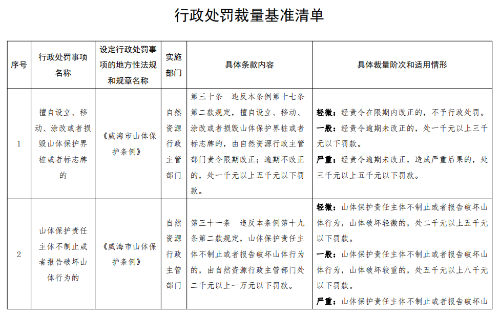
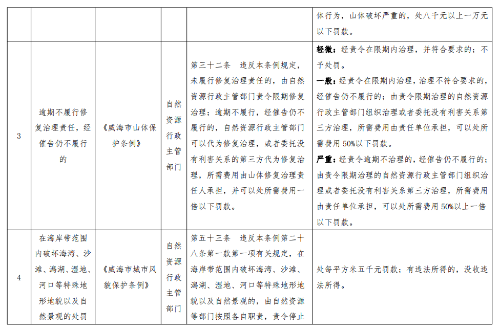
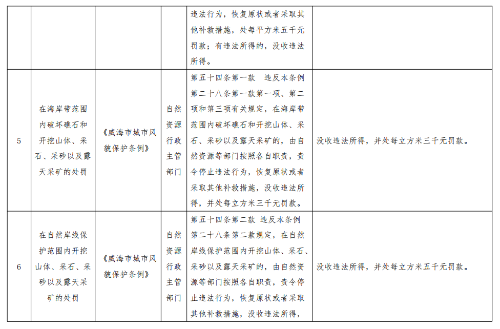
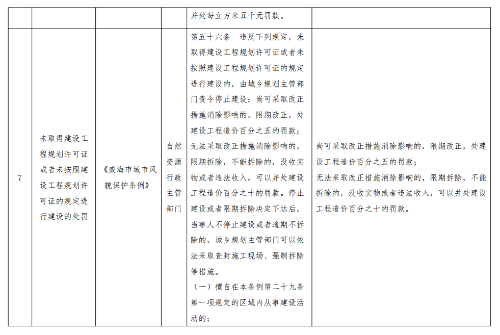
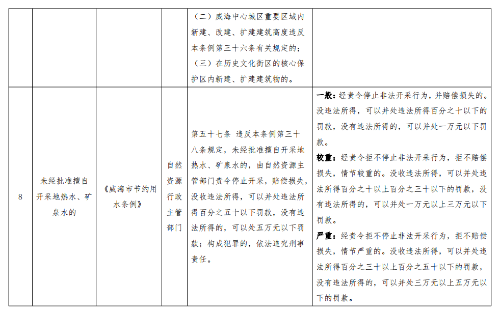
http://www.weihai.gov.cn/art/2022/12/15/art_103264_21906.html
《威海市自然资源和规划局关于印发<威海市山体保护条例>等行政处罚裁量基准的通知》政策解读
时间: 2022-12-16
一、政策背景
行政处罚是行政执法部门行使的重要行政执法权,处罚裁量是否合理、适当,直接影响行政相对人的权益。建立行政处罚裁量基准制度,能够规范执法部门自由裁量权,切实保障地方性法规的正确实施,提高行政执法质量和公信力。为规范《威海市山体保护条例》《 威海市城市风貌保护条例》《威海市节约用水条例》等地方性法规设定的行政处罚事项裁量基准的制定和使用,促进严格规范公正文明执法,切实保障当事人的合法权益,市自然资源和规划局研究制定《威海山体保护条例》等行政处罚裁量基准清单(以下简称“裁量基准”)。
二、基本原则
行政处罚自由裁量权是在具体执法办案活动中客观存在的。裁量基准的制定考虑行政处罚的公平公正合理,同时兼顾行政执法的实际特点,在充分调研并听取各方意见的基础上,遵循以下原则:
(一)合法性原则。为了切实履行法定职责,《裁量基准》严格根据《中华人民共和国行政处罚法》《山东省规范行政处罚裁量权办法》等有关规定,在法规规定的处罚种类和幅度范围内划分不同阶次,未超越法定的自由裁量幅度和范围。
(二)合理性原则。实施裁量基准制度,是为了规范而非剥夺裁量权,《裁量基准》结合违法行为的事实、性质等对违法情节予以量化,对应相应违法程度,并统一罚款的量罚幅度标准。
(三)公平公正原则。建立裁量基准制度,执法人员可以依据情节对应的标准进行处罚,从源头上避免执法办案的随意性。当事人也可以按照违法情节对号入座,对执法人员自由裁量权的行使进行监督,确保行政处罚行为的公平、公正、合理。
三、主要内容
《裁量基准》对《威海市山体保护条例》中“擅自设立、移动、涂改或者损毁山体保护界桩或者标志牌的”“山体保护责任主体不制止或者报告破坏山体行为的”“逾期不履行修复治理责任,经催告仍不履行的”,《 威海市城市风貌保护条例》“在海岸带范围内破坏海湾、沙滩、潟湖、湿地、河口等特殊地形地貌以及自然景观的处罚”“在海岸带范围内破坏礁石和开挖山体、采石、采砂以及露天采矿的处罚”“在自然岸线保护范围内开挖山体、采石、采砂以及露天采矿的处罚”“未取得建设工程规划许可证或者未按照建设工程规划许可证的规定进行建设的处罚”及《威海市节约用水条例》“未经批准擅自开采地热水、矿泉水的”等8项违法行为具体裁量阶次和适用情形予以规定,保证行政处罚裁量权的正确行使,维护社会公平正义,保护公民、法人和其他组织的合法权益。
四、政策解读人
市自然资源和规划局法规科 陈瑜,0631—5173035。
Regulations of Weihai Municipality on Water Conservation
(Adopted at the 3rd session of the Standing Committee of the 17th People’s Congress of Weihai Municipality on June 28, 2017, approved at the 31st session of the Standing Committee of the 12th People’s Congress of Shandong Province on July 28, 2017, and amended in accordance with the Decision of the Standing Committee of the People’s Congress of Weihai Municipality on Amending the Regulations of Weihai Municipality on City Scape Protection and Other Four Local Regulations adopted at the 21st session of the Standing Committee of the 17th People’s Congress of Weihai Municipality on December 27, 2019 and approved at the 16th session of the Standing Committee of the 13th People’s Congress of Shandong Province on January 15, 2020.)
Contents
Chapter I General Provisions
Chapter II Water Consumption Administration
Chapter III Water Conservation Measures
Chapter IV Unconventional Water Utilization
Chapter V Incentives and Guarantee Measures
Chapter VI Legal Liabilities
Chapter VII Supplementary Provisions
Chapter Ⅰ General Provisions
Article 1 These Regulations are enacted in accordance with the Water Law of the People’s Republic of China and other relevant laws and regulations, and in light of the actual situations of this Municipality, for the purposes of conserving water resources, improving the efficiency of water consumption and promoting sustainable economic and social development.
Article 2 These Regulations shall be applicable to the water conservation and water consumption administration within the administrative areas of this Municipality.
Article 3 The municipal and district (county-level city) people’s governments shall incorporate water conservation into the national economic and social development planning and the annual plans, establish and complete relevant policies, promote water conservation among the general public and build a water-conserving society.
Article 4 The municipal and district (county-level city) water administration departments shall be responsible for the supervision and administration of water conservation within their respective administrative areas.
The departments of development and reform, education, technology, industry and information, finance, natural resources, housing and urban-rural development, agriculture and rural affairs, health, market supervision and administration and otherwise shall, in accordance with their respective functions and duties, jointly implement relevant work of water conservation.
Article 5 The exploitation of water resources shall follow the principles of prioritizing the use of surface water, restricting the exaction of groundwater, and encouraging the utilization of unconventional water and realize the centralized dispatch and appropriate allocation.
Article 6 The people’s governments at all levels shall conduct extensive promotion and education on water conservation, incorporate water conservation into civility education programs as well as middle- and primary-school curriculum, spread water conservation knowledge, and raise public awareness on water conservation and the protection of water resources.
March of each year shall be the water conservation promotion month of this Municipality.
Article 7 All units and individuals shall have the obligation to conserve water resources, and shall have the right to report acts of wasting water resources.
The municipal and district (county-level city) water administration departments shall improve the report handling mechanism and investigate and deal with the reported cases in a timely manner.
Chapter Ⅱ Water Consumption Administration
Article 8 The municipal and district (county-level city) water administration departments shall, in collaboration with relevant departments, formulate the water conservation planning in accordance with the local economic and social development needs, current situations of water resources and the comprehensive water resources planning, and submit the planning to the people’s governments at the same level for approval.
The formulation of urban-rural planning and regional and industrial development planning shall include the content of water conservation.
Article 9 The total water consumption control system shall be implemented through combining the water consumption control index during planned periods and the annual water consumption control index.
Where the water consumption reaches or exceeds the water consumption control index during a planned period or the annual water consumption control index, the water administration department shall stop approving water drawing permits for the newly constructed, reconstructed or expanded construction projects in this area.
Article 10 The residential water supplied through the municipal public water system shall be subject to a tiered pricing system.
Article 11 The non-residential water shall be subject to a planned quota system.
The non-residential users under the planned quota system shall submit the annual water consumption proposals for the next year to the water administration department before December 31st of each year. The newly listed non-residential users shall submit the annual water consumption proposals for the year before using water.
The water administration department shall, in accordance with the annual water consumption control index, water consumption proposals, water consumption quotas and business operation plans, assign the annual water consumption plans to users before January 31st of each year.
Article 12 In any of the following circumstances, the water administration department shall reduce the annual water consumption quota of the non-residential water users concerned:
(i) exceeding the unit water consumption quota;
(ii) using any water consumption technology, technique, product or equipment that has been officially eliminated by the State or Shandong Province;
(iii) failing to install water-conserving utensils meeting the national and provision standards on the showering equipment of business industries such as bath, swimming and water parks;
(iv) car-washing or other businesses failing to adopt water conservation measures;
(v) failing to conduct water balance tests as required by law;
(vi) failing to use unconventional water when such use is possible.
Article 13 The non-residential users using water supplied through the urban public supply system and being managed under the planned quota system shall be charged extra water rates for consumption above the quota according to the following standards:
(i) for excess consumption up to 10% of the quota, base price of the comprehensive end-user water rate shall be charged;
(ii) for excess consumption no less than 10% but up to 30%, twice of the base price shall be charged;
(iii) for excess consumption no less than 30%, 3 times of the base price shall be charged.
The income from excess water rates shall be managed under the category of non-tax governmental income and shall be used exclusively for the construction and management of water conservation facilities and equipment.
Article 14 The non-residential water users shall establish water consumption management system, properly maintain water consumption records and statistical ledgers, and strengthen routine management of water consumption.
Article 15 The non-residential water users who are managed under the planned quota system and consume more than 20,000 cubic meters of water annually shall conduct water balance tests once per 3 years and report the results to the water administration department for recordation. The non-residential water users shall conduct new water balance tests upon changing the production technology, technological process, and the scale of production.
The water administration departments shall instruct and supervise the water balance tests of non-residential water users in accordance with the national standards of water balance tests.
Article 16 The municipal and district (county-level city) price administration departments shall conduct regular cost supervision and examination once per 3 years, comprehensively consider the supply and demand for water resources, the requirements for the national economy and social development and the social affordability in accordance with the results of the cost supervision and examination, and adjust the urban water rates accordingly.
The municipal and district (county-level city) price administration departments shall conduct cost supervision and examination of pricing and price adjustment for the municipal public water supply system when initiating the pricing and price adjustment process for the municipal public water supply system. The results of the cost supervision and examination shall be made available to the public.
Article 17 The exploitation of groundwater shall be strictly restricted. Where it is necessary to exploit groundwater, a scientific assessment, a water drawing permit and a maximum yield limit on the amount of water shall be required.
Within the areas where groundwater is under overexploitation, agricultural, industrial and services businesses shall be prohibited to increase the yield of groundwater, and the current yield of groundwater shall be gradually reduced. Within the areas where the exploitation of groundwater is under restriction, the number of newly drilled groundwater wells and the yield of groundwater shall be strictly restricted. Within the areas where the exploitation of groundwater is prohibited, no new construction, reconstruction, or expansion of any project of groundwater extraction is allowed.
Chapter Ⅲ Water Conservation Measures
Article 18 The unit and individual water users shall install well-functioning water metering devices.
The water meters shall be installed in residential buildings household-by-household. The water consumption for production and for residential use in the industrial enterprises shall be measured separately. The water meters shall be separately installed for workshops and equipment which significantly contribute to the total water consumption.
Article 19 The unit and individual water users shall adopt water-conserving techniques, equipment and products.
The utilization of any high-water-consumption technique, equipment and product that has been officially eliminated by the State or Shandong Province shall be prohibited.
Article 20 It is prohibited to produce and sell any high-water-consumption technique, equipment and product that has been officially eliminated by the State or Shandong Province.
Article 21 The plan for water conservation measures shall be formulated for the new construction, reconstruction and expansion of construction projects, with the complementary water conservation facilities being established simultaneously. The water conservation facilities shall be designed, constructed and put into use synchronized with the main project.
Article 22 The construction units shall use the low-water-consumption materials. The use of such unconventional water as water stored in building foundation pits or reclaimed water shall be prioritized in the construction.
Article 23 The use of drought resistant or low-water-consumption plants shall be prioritized in the urban landscaping. The use of such unconventional water as rainwater, reclaimed water, water stored in building foundation pits, or pond water shall be prioritized for urban vegetation irrigation. Such water-conserving irrigation techniques as sprinkling irrigation or micro irrigation shall be encouraged.
Article 24 The showering facilities in such industries as bath, swimming, and water amusement shall use water-conserving utensils in accordance with the standards of the State and Shandong Province.
The car washing businesses shall adopt low-water-consumption car washing techniques to lower the water consumption and be encouraged to recycle water for car washing.
Article 25 The multiple-use of water in households shall be advocated.
Article 26 The municipal public water suppliers shall enhance the regular maintenance and management of the water supply network, establish inspection system, and conduct regular check on the supply network for any leakage.
The leakage rate of the municipal public water supply system shall conform to the national standards. The leakage above the standard shall not be included in the cost for pricing.
Article 27 The unit and individual water users shall regularly inspect, repair and maintain the water-using facilities and equipment to reduce the leakage and loss of water. Where the spillage, overflow, dripping or leakage of water occurs due to damage of the water consumption facilities or equipment , repairment shall be made promptly.
Article 28 Where the normal water supply is interrupted by natural disaster, emergency or other incidents, the municipal and county-level people’s governments may adopt water restriction measures and prioritize the availability of water for household use.
Chapter Ⅳ Unconventional Water Utilization
Article 29 It is encouraged and supported to use such conventional water as the rainwater, reclaimed water, seawater, water stored in building foundation pits and otherwise and incorporate such into the unified distribution plan of water resources to optimize the composition of water utilization
Where it is possible to use unconventional water, it is prohibited to use tap water for street cleaning, urban vegetation irrigation, landscape irrigation and car washing.
Article 30 The construction units shall, in the new construction, reconstruction and expansion of the following construction projects, establish complementary facilities for reclaimed water utilization in accordance with the specifications and standards for the construction of reclaimed water utilization facilities:
(i) hotels, restaurants, apartments, or building complexes with a total floor area of no less than 20,000 square meters;
(ii) governmental buildings, non-enterprise entity buildings, comprehensive cultural and sports facilities with a total floor area of no less than 30,000 square meters;
(iii) industrial enterprises with a daily discharge of no less than 300 cubic meters.
The residential communities shall be encouraged to build reclaimed water utilization facilities.
Article 31 The new construction, reconstruction and expansion of urban infrastructures, buildings or residential communities shall be accompanied by the construction of facilities for the collection, utilization, infiltration and other uses of rainwater. The division of rainwater and sewage shall be practiced. The recycling efficiency of rainwater shall be improved.
Article 32 The owner or management unit of the existing urban infrastructures and buildings shall be encouraged to reconstruct utilization facilities for reclaimed water and rainwater.
Article 33 The pipelines and water tanks of reclaimed water shall not be directly connected to the supply pipelines of tap water and groundwater.
The outlets of reclaimed water in public spaces shall bear warning signs of “Not for drinking” or other conspicuous symbols.
Article 34 The industrial enterprises shall adopt advanced technologies, techniques and equipment to improve the recycling rate of water.
For industrial enterprises within areas covered by the reclaimed water supply system, the percentage of reclaimed cooling water in total reclaimed water consumption shall not be lower than 20%.
For thermal power plants, the percentage of reclaimed water in total water consumption shall not be lower than 50%.
Article 35 The new construction, reconstruction and expansion of sewage treatment plants shall adopt advanced sewage treatment technology and techniques to raise the quality standard of reclaimed water and satisfy the demands from the users of reclaimed water.
The new construction, reconstruction and expansion of sewage treatment plants, shall be accompanied by the establishment of complementary facilities of reclaimed water utilization to increase the utilization rate of reclaimed water.
The water users within areas of the reclaimed water supply system shall prioritize the use of reclaimed water.
Article 36 The suitable units shall be encouraged to construct desalination plants, seawater direct utilization plants and other facilities to scientifically exploit seawater resources.
Article 37 The municipal and district (county-level city) people’s governments shall incorporate geothermal water and mineral water into the overall plan for mineral resources, and ensure the reasonable exploitation and comprehensive utilization of geothermal water and mineral water.
The approval for total number of geothermal water and mineral water drills shall be strictly controlled. The application for the exploitation of geothermal water and mineral water shall be submitted to the water administration department and the natural resources department successively and be implemented upon being approved thereby.
Chapter V Incentives and Guarantee Measures
Article 38 The municipal and district (county-level city) people’s governments shall, in light of the economic development level and the conditions of local water resources, under the premise of guaranteeing the basic household water consumption and in accordance with the principles of recouping the cost, reasonable profit, fair price for good quality and justly splitting the expense, establish the water pricing mechanism to provide water-saving incentives for the general public.
Article 39 The municipal and district (county-level city) people’s governments or the water administration department shall establish the water conservation reward system to commend or award units or individuals having any of the following circumstances:
(i) where any non-residential user has made outstanding performance in water conservation or water consumption reduction;
(ii) where the water supply loss of any public water supplier is significantly lower than the national standards;
(iii) where any unit or individual has made outstanding achievements in the utilization of unconventional water;
(iv) where any unit or individual has made remarkable contributions to the promotion of water conservation technology, techniques, equipment or products;
(v) where any unit or individual has made outstanding performance in the promotion and education of water conservation;
(vi) where any unit or individual has reported severe water-wasting act, which is later investigated and verified.
Article 40 The municipal and district (county-level city) people’s governments shall enhance the financial support for water conservation, foster and develop the water conservation industries and strengthen the construction of complementary water conservation facilities.
The municipal and district (county-level city) people’s governments shall adopt measures to support the research, development, popularization and utilization of water conservation technology, techniques, equipment and products and priority shall be given to crucial water conservation technology research and development projects in the formulation of technological innovation plans or science and technology plans.
Article 41 The people’s governments at all levels shall develop such facilities as the unconventional water supply system to improve the supply capacity for unconventional water.
Article 42 The people’s governments at all levels shall increase the financial support for the construction of water conserving agricultural facilities and small-scale water conservancy facilities. The rural collective economic organizations, new agricultural business entities and individuals are encouraged to protect, develop and utilize ponds, dams and other water bodies, and construct water storage works to contain rainwater and increase effective water sources.
Such water conserving irrigation methods as pipeline irrigation, seepage-proof tunnels, sprinkling irrigation, micro-irrigation shall be popularized by the people’s governments at all levels in light of the circumstances of local areas, in order to develop efficient water-saving agriculture.
Article 43 The municipal and district (county-level city) departments of agriculture and rural affairs, water, and otherwise shall promote the building of socialized service system for water conservation in agriculture, and improve agricultural water consumption efficiency.
Article 44 The municipal and district (county-level city) water administration departments shall, in collaboration with the departments of agriculture and rural affairs, science and technology and otherwise, strengthen the technological instruction and training of the unit and individual water users on water conservation, and popularize water conservation know-how and practices.
Article 45 The municipal and district (county-level city) industry and information departments shall duly publicize the list of huge-water-consumption techniques, equipment and products that have been officially eliminated by the State and Shandong Province, investigate and punish acts of producing, selling or using such techniques, equipment and products as prescribed by law.
Article 46 The municipal and district (county-level city) market supervision and administration departments shall conduct supervision and administration of water metering, investigate and punish acts of using unverified water meters or unqualified water meters upon verification as prescribed by law.
Article 47 The municipal and district (county-level city) market supervision and administration departments shall strengthen the regulation and administration on the sale of water meters, investigate and punish any acts of selling unqualified water meters as prescribed by law.
Article 48 The municipal and district (county-level city) water administration departments shall regularly conduct water conservation inspections and are authorized to take the following measures:
(i) demanding the inspected unit or individual to show the relevant documents, licenses or other materials;
(ii) demanding the inspected unit or individual to explain certain matters;
(iii) entering the water use sites of the inspected unit or individual for inspection.
The inspected unit or individual shall fully cooperate and provide authentic information, and shall not reject or obstruct inspectors from performing their legal duties as prescribed by law.
Chapter Ⅵ Legal Liabilities
Article 49 Where any law or regulation has provided for the legal liabilities for violation of these Regulations, such law or regulation shall prevail; otherwise these Regulations shall prevail.
Article 50 Any staff of the water administration departments and relevant departments conducts abuse of power, neglect of duty and play of favoritism and commission of irregularities in the performance of duties shall be sanctioned by the unit concerned or relevant organs in accordance with law; where any crime is constituted, criminal liabilities shall be investigated in accordance with law.
Article 51 Any non-residential water user managed under the planned quota system, in violation of Article 11 of these Regulations, failing to submit water consumption proposal to the water administration department in the specified time limit, shall be warned and ordered by the water administration department to make rectification within a specified time limit; failing which a fine of no less than RMB 1,000 and no more than RMB 10,000 shall be imposed.
Article 52 Any non-residential water user, in violation of Article 15 of these Regulations, failing to conduct water balance test as required shall be ordered by the water administration department to make rectification within a specified time limit; failing which a fine of no less than RMB 5,000 and no more than RMB 20,000 shall be imposed.
Article 53 Any unit or individual water user, in violation of Article 19 of these Regulations, using any high-water-consumption technique, equipment or product that has been officially eliminated by the Shandong Province in operations shall be ordered by the industry and information department to stop such use, seek a replacement or undergo a water conservation reconstruction within a specified time limit; failing which a fine of no less than RMB 10,000 and no more than RMB 30,000 shall be imposed.
Article 54 Any unit or individual, in violation of Article 29 of these Regulations, failing to use unconventional water where possible and use tap water for street cleaning, urban vegetation irrigation, landscape irrigation or car washing shall be ordered by the water administration department to make rectification within a specified time limit; and a fine of no less than RMB 10,000 and no more than RMB 30,000 shall be imposed.
Article 55 Any construction unit, in violation of Article 30 of these Regulations, failing to build complementary reclaimed water utilization facilities in accordance with statutory requirements for newly constructed, reconstructed and expanded construction projects shall be ordered by the urban water conservation department to make rectification within a specified time limit; failing which a fine of no less than RMB 150,000 and no more than RMB 200,000 shall be imposed.
Article 56 Any unit or individual, in violation of Article 33 of these Regulations, directly connecting pipeline or water tanks containing reclaimed water to the supply pipelines of tap water or underground water shall be ordered by the water administration departments to make rectification within a specified time limit and a fine of no less than RMB 5,000 and no more than RMB 10,000 shall be imposed; where any damage is caused, civil liabilities shall be investigated in accordance with law; where any crime is constituted, criminal liabilities shall be investigated in accordance with law.
Article 57 Any unit or individual, in violation of 37 of these Regulations, extracting mineral water or geothermal water without permission shall be ordered by the natural resources department to stop extraction and compensate for the loss, the illegal gains shall be confiscated and a fine of no more than 50% of the illegal gains may be imposed; where no illegal gains is obtained, a fine of no more than RMB 50,00 may be imposed; where any crime is constituted, criminal liabilities shall be investigated in accordance with law.
Chapter Ⅶ Supplementary Provisions
Article 60 These Regulations shall come into force as of September 1, 2017.